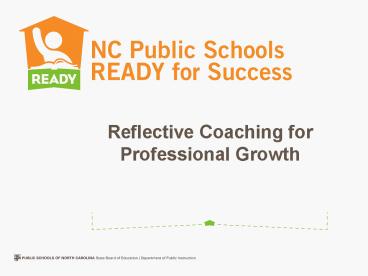Reflective Coaching for Professional Growth - PowerPoint PPT Presentation
1 / 24
Title:
Reflective Coaching for Professional Growth
Description:
Reflective Coaching for Professional Growth – PowerPoint PPT presentation
Number of Views:260
Avg rating:3.0/5.0
Title: Reflective Coaching for Professional Growth
1
Reflective Coaching for Professional Growth
2
Reflective Coaching
Adapted from Costa and Garmston (1985) Cognitive
Coaching Framework
3
Reflective Coaching is not
- Reflective coaching has nothing to do with
evaluation. Observations are not evaluationsthey
are single points in time. - The evaluation is the Summary Rating Form
completed at the end of the evaluation process. - Mentoring
4
Research Based Benefits
- Coaching is linked with higher test scores
- Teachers who are coached report higher teacher
efficacy - Teachers who are coached demonstrate more
reflective, complex thinking about their practice
- 4. Coached teachers report higher job
satisfaction - 5. Coaching schools have higher self-ratings for
professionalism - 6. Coaching schools have more collaboration
- 7. Coached teachers report feeling more
supported professional and personally
5
Requirements for Reflective Coaching
- Trust
- Communication Awareness
- Appropriate Responses
- Knowledge
- Structure
- Questioning
- Costa, A. Garmston, R.(2002). Cognitive
Coaching a Foundation for Renaissance Schools.
Norwood, Massachusetts Christopher-Gordon, Inc.,
398-399.
6
Components of Trust
- Being present
- Being aware of oneself, others and the
environment - Being open
- Listen without judgment and with empathy
- Seek to understand
- View learning as mutual
- Honor the person
- Honor the process
7
- Your words and what you say must be congruent
with your body language. - Unknown
8
Communication Awareness
- 65 Non Verbal Components
- 35 Verbal
- Components
- Pitch
- Volume
- Inflection
- Pace
- Words
- Posture
- Gesture
- Proximity
- Muscle Tension
- Facial Expression
9
Appropriate Responses
- Silence
- Acknowledging
- Paraphrasing
- Clarifying
- Questioning
- Probing
- Providing Data Resources
10
Knowledge
11
North Carolina Professional Teaching Standards
12
Image Credits http//ellie-sparks.livejournal.co
m/3021.html http//www.shoveitinyourface.com/2011
/02/chocolate-and-golden-vanilla-triple.html http
//find-how.com/Cake-recipe.html
13
Knowledge
14
Implementation with Fidelity
15
Structuring
- Establishing a common understanding of the
purposes for the coaching - Communicating expectations about the use of
resources and materials - Establishing a common understanding of teaching
standards and ratings
16
Questioning
Its not the answers that enlighten us, but the
questions.
- Questions are intentionally designed to engage
and transform thinking and perspective. - Questions must meet three criteria
- Invitational in form
- Engage complex cognitive processes
- Intentional
17
Judgmental vs. Non-Judgmental Questioning
- Example
- Why did you do it that way?
- What would you do differently next time if you
could?
18
Probing Practice
- Scenario Imagine a teacher says the following
- "My third period class is so rowdy, I just cannot
do anything with them! - Formulate questions to influence this teachers
thinking. - Think-Pair-Share
19
The Observation More than meets the eye
- You are observing the teachers decision-making
process concerning - Planning (prior to instruction)
- Interacting (instruction)
- Reflecting (after instruction)
20
Post-Conference Coaching
- Begins with open-ended question
- Teacher does most of the talking
- Coaches comments are grounded in facts
- Paraphrasing shows that
you value what you are
hearing
21
Stems Cognition
Cognitive Operation Question Stems
Relevance/Justification How is this important to?
Metacognition What were you thinking when?
Evidence How will you know if? What evidence supports?
Predictions If you were towhat do you predict would happen?
Data Use Of what use will you make of these data? What would that information tell you?
Alternatives How else might you?
Perspective How would you feel if?
Causality What did you do to cause.?
A reflective coach collects data and learns to
pose questions to engage the teacher in
reflective thinking.
22
Tips for Successful Coaching
- Provide Positive Feedback
- Specific and genuine
- Integrity Builds Trust
- Be honest
- Stick to the facts DOCUMENT!!
- Use student data
- Collaborate
- Set goals
- Plan the next meeting and/or observation
23
Tips for Successful Coaching
- Build In Support
- Provide resources
- Always Focus on School Vision and Student Growth
- Celebrate Success!!
24
References
- Cognitive Coaching What is it? (2011). UTEACH.
The University of Texas at Austin. Retrieved
from http//csuscognitivecoachingflc.wikispaces.
com/file/view/CognitiveCoaching-UofTexas.pdf - Costa, A. Garmston, R. (1985, February)
"Supervision for Intelligent Teaching."
Educational Leadership, 42 (5), 70-80. - Costa, A. Garmston, R. (1992) Cognitive
Coaching A Strategy For Reflective Teaching
Teacher support specialist instructional
handbook. Winterville, GA Northeast Georgia
RESA, pp. 91-96. - Costa, A. Garmston, R.(2002). Cognitive
Coaching a Foundation for Renaissance Schools.
Norwood, Massachusetts Christopher-Gordon, Inc.,
398-399.































